What Makes A Food Nutrient-dense?
What makes a food nutrient-dense? In simple terms, it means that the food contains a high amount of nutrients in comparison to its calorie content. A nutrient-dense food provides vitamins, minerals, and other essential nutrients that are necessary for a healthy body. Nutrients are vital for maintaining our health and well-being, and incorporating nutrient-dense foods into our diet can help us to achieve this.
When we talk about nutrient-dense foods, we are referring to foods that are rich in vitamins, minerals, fiber, protein, and healthy fats. These foods provide us with the essential building blocks that our bodies need to function properly. Examples of nutrient-dense foods include fruits, vegetables, whole grains, lean proteins, nuts, and seeds.
- Fruits and vegetables: These are some of the most nutrient-dense foods available. They are packed with vitamins, minerals, and fiber, and are low in calories. Some of the best options include spinach, kale, broccoli, sweet potatoes, and blueberries.
- Whole grains: These are another great source of nutrients, including fiber, vitamin B, and minerals such as iron and zinc. Examples include quinoa, brown rice, and oats.
- Lean proteins: These provide amino acids, which are essential for building and repairing tissue. Lean meats, fish, and plant-based proteins such as lentils and beans are all great options.
It is important to note that not all foods are created equal when it comes to nutrient density. Processed and packaged foods, for example, are often high in calories and low in nutrients. In contrast, whole foods that are minimally processed tend to be much more nutrient-dense.
Incorporating more nutrient-dense foods into your diet can have a positive impact on your overall health and well-being. These foods can provide the nutrients your body needs to function properly, boost your energy levels, and even help you to maintain a healthy weight. So, next time you’re thinking about what to eat, remember to choose foods that are packed with nutrients to get the most out of your meals.
The Top 11 Nutrient-dense Foods
Nutrient-dense foods are those that provide a high amount of nutrients per calorie. They are essential for maintaining a healthy diet and helping the body function properly. Some of the top nutrient-dense foods include:
- Salmon – one of the best sources of omega-3 fatty acids, which are important for heart and brain health.
- Blueberries – packed with antioxidants, which help protect the body from damage caused by free radicals.
- Sweet potatoes – contain high concentrations of vitamins A and C, as well as fiber and other important nutrients.
- Broccoli – a cruciferous vegetable that is rich in fiber, vitamins, and minerals. It is also known to have cancer-fighting properties.
- Almonds – a nutrient-dense nut that is packed with heart-healthy fats, fiber, and other important nutrients.
- Kiwi – a fruit that is high in vitamin C and fiber, and also has digestive benefits.
- Quinoa – a gluten-free grain that is high in protein and contains all nine essential amino acids.
- Kale – a leafy green vegetable that is packed with vitamins, minerals, and antioxidants.
- Chia seeds – a superfood that contains omega-3 fatty acids, protein, and fiber.
- Lentils – a plant-based protein that is high in iron and folate, and also a good source of fiber.
- Dark chocolate – a delicious source of antioxidants and magnesium. Make sure to choose a high-quality dark chocolate with at least 70% cocoa solids.
When it comes to nutrient-dense foods, it’s important to choose a variety of different foods to ensure that you are getting all of the nutrients your body needs. Incorporating these 11 foods into your diet can help boost your overall health and wellbeing.
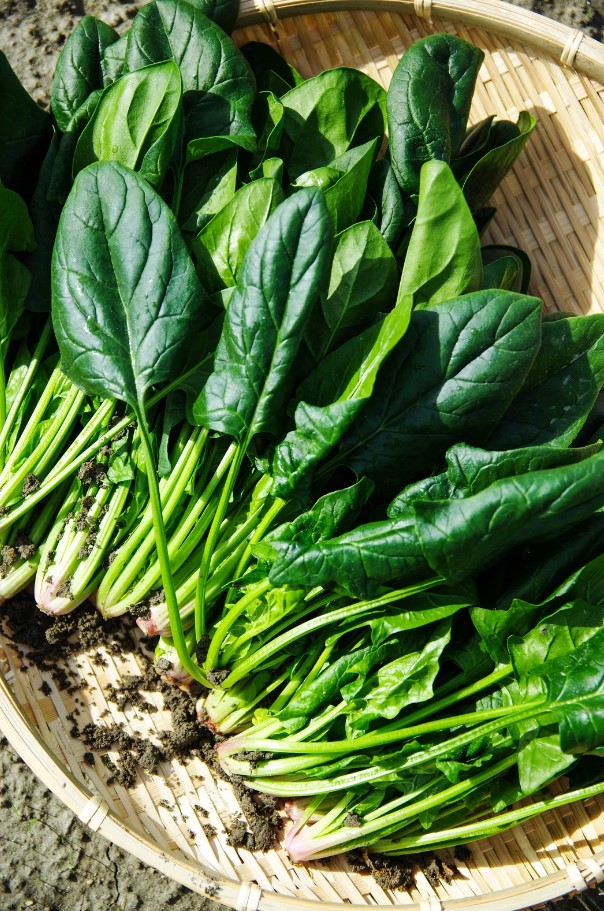
Spinach – Power Packed With Vitamins And Minerals
When it comes to healthy eating, spinach is definitely a superstar. This leafy green vegetable is a nutritional powerhouse, packed with vitamins and minerals that offer an impressive range of health benefits. Spinach is loaded with nutrients like vitamin A, vitamin C, vitamin K, folate, iron, calcium, and magnesium. It also contains antioxidants and other compounds that help to protect the body from various diseases.
- Vitamin A: Spinach is an excellent source of vitamin A, which is important for healthy vision, immune function, and cell growth.
- Vitamin C: Spinach is another great source of vitamin C, which plays a crucial role in the growth, development, and repair of body tissues.
- Folate: Spinach is packed with folate, a B-vitamin that is essential for healthy cell growth and development.
- Iron: Spinach is a good source of iron, which is needed to produce hemoglobin, the protein that carries oxygen throughout the body.
- Calcium: Spinach is rich in calcium, which is essential for healthy bones and teeth.
- Magnesium: Spinach is also a good source of magnesium, which plays a key role in many biological processes in the body.
- Antioxidants: Spinach contains a variety of antioxidants, including flavonoids and carotenoids, that help to protect the body from oxidative stress and inflammation.
Incorporating spinach into your diet is easy. You can add it to salads, soups, smoothies, and sautés. Spinach also makes a great base for dips and spreads. It’s important to note that spinach is high in oxalates, which can interfere with the absorption of calcium and other minerals. However, cooking spinach can help to reduce the oxalate content and make it easier for the body to absorb its nutrients.
| Spinach nutrition information (1 cup raw) | Amount | % daily value |
|---|---|---|
| Calories | 7 | |
| Protein | 0.9g | 2% |
| Fat | 0.1g | |
| Carbohydrates | 1.1g | 0% |
| Fiber | 0.7g | 3% |
| Vitamin A | 56% DV | |
| Vitamin C | 14% DV | |
| Vitamin K | 181% DV | |
| Folate | 15% DV | |
| Iron | 5% DV | |
| Calcium | 2% DV | |
| Magnesium | 6% DV |
Overall, spinach is an incredibly healthy and nutrient-dense food that you should consider adding to your diet. Whether you’re looking to boost your immune system, support healthy vision, or strengthen your bones, spinach has something to offer. So next time you’re at the grocery store, be sure to pick up some of this versatile leafy green.
Salmon – A Fatty Fish With High Amounts Of Omega-3
Salmon is, without doubt, one of the healthiest foods in existence. This fatty fish is a rich source of omega-3 fatty acids, which are essential for maintaining optimal health. Omega-3 fatty acids provide numerous health benefits, including reducing inflammation, improving brain function, and reducing the risk of heart disease. The high amounts of omega-3 in salmon make it an ideal addition to your diet if you want to improve your overall health and wellbeing.
In addition to its omega-3 content, salmon is also a good source of protein, which is essential for building and repairing tissues in the body. This nutrient-dense fish is also rich in vitamins and minerals, including vitamin D, vitamin B12, selenium, and potassium, all of which play important roles in maintaining good health. With its impressive nutrient profile, it’s easy to see why salmon is one of the top superfoods on the planet.
- Improved cardiovascular health: Studies have shown that the omega-3 fatty acids found in salmon can reduce the risk of heart disease by lowering blood pressure, reducing inflammation, and decreasing the risk of blood clots.
- Improved brain function: The omega-3 fatty acids in salmon have been shown to improve brain function and memory, and may help reduce the risk of Alzheimer’s disease and dementia.
- Reduced inflammation: Inflammation is a natural response to injury or infection, but chronic inflammation can contribute to a range of health problems. The omega-3 fatty acids found in salmon can help reduce inflammation in the body, which may help reduce the risk of chronic diseases such as arthritis and cancer.
Overall, including salmon in your diet is a great way to improve your health and wellbeing. Whether you enjoy it grilled, baked, or smoked, this delicious fish is a tasty and nutritious addition to any meal plan. So go ahead and indulge in some salmon – your body will thank you for it!
Blueberries – An Antioxidant-rich Superfood
Blueberries are well-known for their exciting burst of flavor and are a great source of nutrition. These small berries are packed with antioxidants and numerous health benefits, making them a favorite among health enthusiasts. Blueberries can be consumed in a variety of ways, including as a snack, added to smoothies, or used as a topping for baked goods. The versatility of these delicious berries makes it easier to incorporate them into your daily meals and reap the benefits they provide.
Blueberries are rich in antioxidants, a compound that helps reduce oxidative stress in the body. Oxidative stress occurs when there is an imbalance between free radicals and antioxidants in the body. This can lead to chronic inflammation and cause damage to cells, contributing to the development of diseases like cancer and heart disease. By consuming blueberries regularly, you can help reduce oxidative stress and inflammation in your body, protecting it from various health problems.
- In addition to their antioxidant properties, blueberries are also a great source of fiber, vitamin C, vitamin K, and manganese. One serving of blueberries contains only 80 calories and is also low in fat, making them an excellent food to incorporate into a weight-loss diet.
- Research has shown that the consumption of blueberries can improve cognitive function and memory in older adults. Blueberries contain anthocyanins, which are responsible for the berry’s distinctive color and provide numerous benefits to brain function. These compounds can help improve brain function and increase blood flow to the brain, improving memory and concentration over time.
- Blueberries are also good for heart health. The soluble fiber in the berries helps lower cholesterol levels, reducing the risk of heart disease. The high amounts of potassium in blueberries also help regulate blood pressure, making them an ideal food for those with high blood pressure or hypertension.
As you can see, blueberries are an important and nutritious food that is great to incorporate in your daily diet. With their high concentration of antioxidants, fiber, vitamins, and minerals, blueberries provide various health benefits, including improved cognitive function, heart health, and weight loss. Whether consumed as a snack or added to your favorite dish, these superfoods are sure to provide the nourishment your body needs.
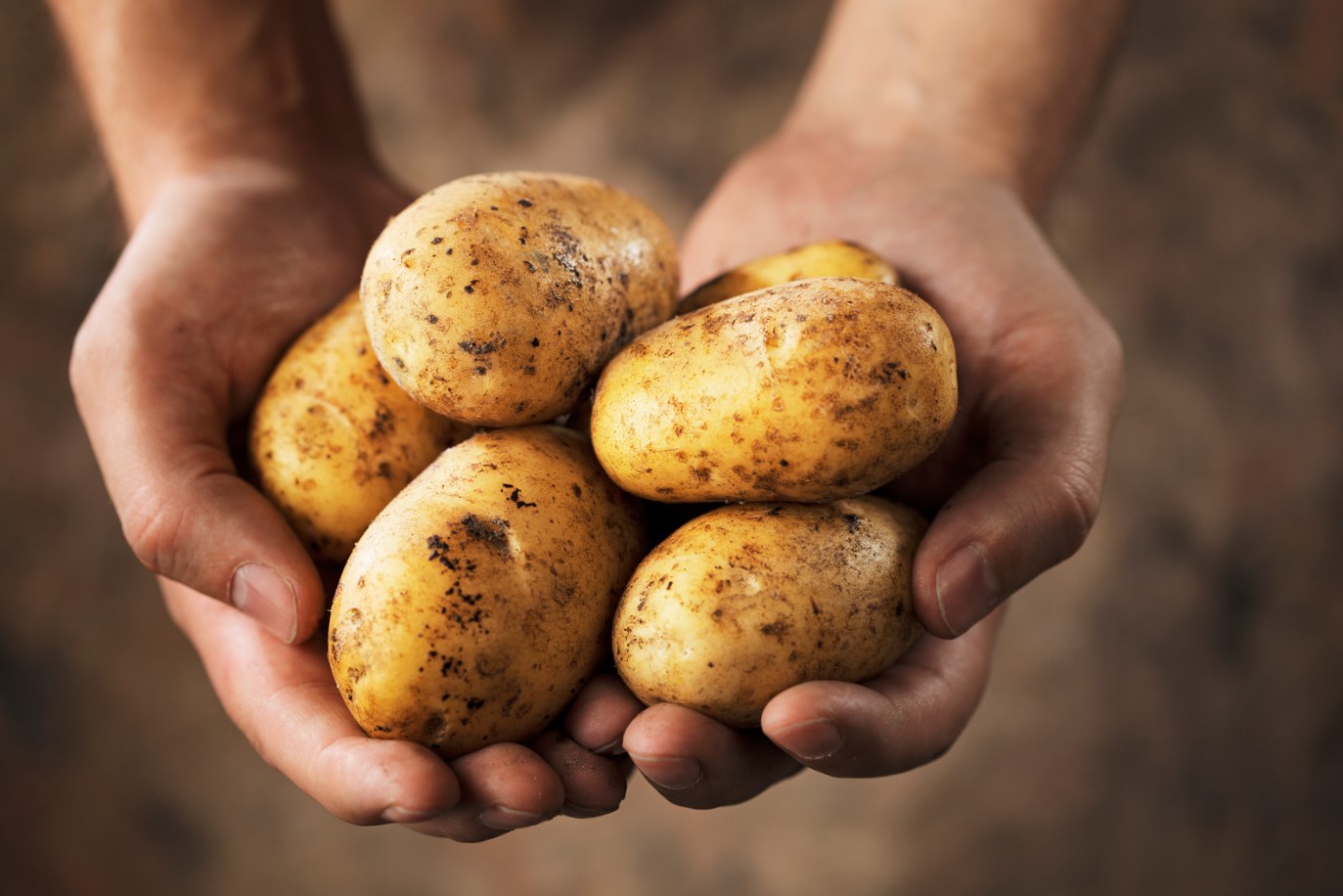
Sweet Potatoes – A Carb With A High Concentration Of Vitamins
Are you looking for a delicious and nutritious way to include carbohydrates in your diet? Look no further than sweet potatoes! These root vegetables are a great source of complex carbs, which provide sustained energy and regulate blood sugar levels. Additionally, sweet potatoes are loaded with vitamins and minerals that promote overall health and vitality.
One of the standout nutrients found in sweet potatoes is vitamin A, which is essential for healthy vision, skin, and immune function. In fact, just one medium sweet potato contains over 400% of the daily recommended value of vitamin A! Sweet potatoes are also a good source of vitamin C, which supports collagen production and helps protect against oxidative stress.
- In addition to their vitamin content, sweet potatoes are rich in other antioxidants like beta-carotene and anthocyanins. These compounds help protect against chronic disease and inflammation.
- Furthermore, sweet potatoes contain several important minerals, including potassium, manganese, and copper.
| Nutrient | Amount per 1 medium sweet potato | % Daily Value |
|---|---|---|
| Vitamin A | 1,067 mcg | 471% |
| Vitamin C | 22.3 mg | 25% |
| Potassium | 542 mg | 12% |
| Manganese | 0.6 mg | 26% |
If you’re looking to add more sweet potatoes to your diet, there are countless ways to enjoy these versatile veggies. Try baking sweet potato fries, mashing them as a side dish, or adding diced sweet potatoes to soups or stews. You can also experiment with sweet potato casserole, muffins, or pancakes for a delicious and healthy twist on your favorite recipes!
Overall, sweet potatoes are a delicious and nourishing way to incorporate carbohydrates into your diet. With their impressive nutrient profile and versatility in the kitchen, there’s no reason not to give these tasty tubers a try!
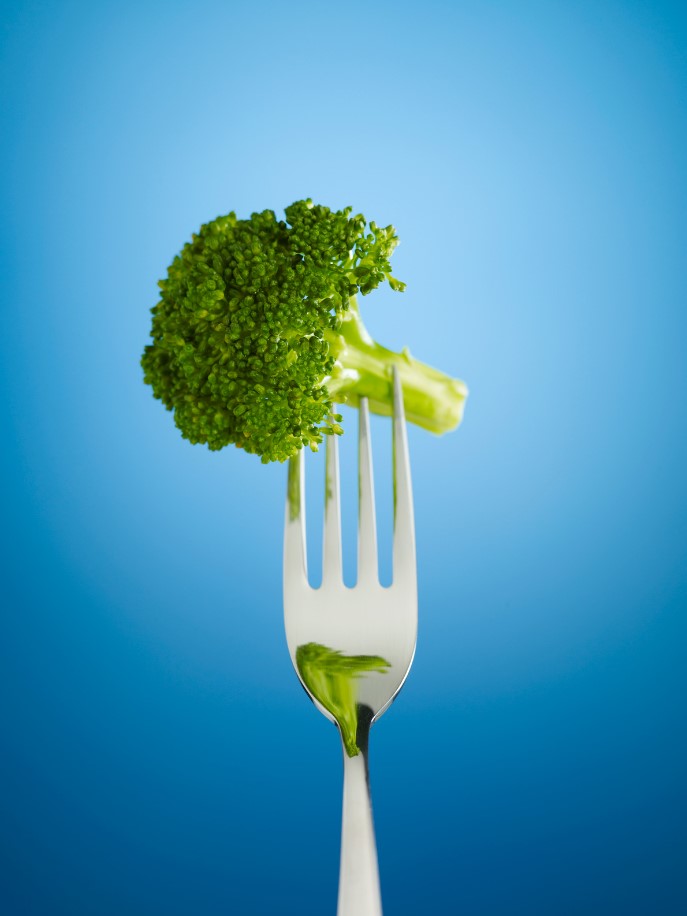
Broccoli – Cruciferous Vegetable For Cancer Prevention
Broccoli is a cruciferous vegetable, and it is known for its significant health benefits. It contains a high concentration of fiber, vitamins, and minerals that are essential for our body. It is also a great source of phytochemicals, which can protect our body from various diseases, including cancer. These powerful phytochemicals are responsible for broccoli’s cancer preventive properties.
One of the most well-known phytochemicals in broccoli is sulforaphane, and it is known for its ability to induce the production of enzymes that can detoxify the body and inhibit cancer cells’ growth. The high fiber content in broccoli can also aid in digestion and reduce the risk of colon cancer. It is also a rich source of vitamin C, which is an antioxidant that can help prevent the formation of cancer-causing cells.
- Broccoli is also rich in vitamin K, which plays a vital role in bone health.
- The high concentration of folate in broccoli is beneficial for pregnant women as it helps in the development of the fetal brain.
- It is also a great source of potassium, which can help regulate blood pressure and reduce the risk of heart disease.
Broccoli is a versatile vegetable that can be eaten cooked or raw. However, it is essential to prepare it in a way that preserves its nutrients. Overcooking broccoli can lead to the loss of these essential nutrients. It is best to steam or stir-fry broccoli to maintain its nutritional value.
| Nutrients | Amount per 100 grams |
|---|---|
| Vitamin C | 89.2 mg |
| Vitamin K | 101.6 mcg |
| Fiber | 2.6 g |
| Folate | 63 mcg |
| Potassium | 316 mg |
In conclusion, broccoli is a powerful and nutrient-dense vegetable that can provide significant health benefits. Its cancer preventive properties make it an essential addition to our diet. By incorporating broccoli into our meals, we can protect our body from various diseases and promote overall well-being.
Almonds – A Nutrient-dense Nut With Heart-healthy Benefits
Almonds are a nutrient-dense nut that offers various heart-healthy benefits. These nuts can be eaten alone as a snack or used as an ingredient in a variety of dishes. Almonds are a rich source of vitamins, minerals, and healthy fats, making them an excellent addition to any diet.
- Healthy fats: Almonds are high in monounsaturated fats, which are known to help reduce bad cholesterol levels, leading to a healthier heart.
- Protein: Almonds are an excellent source of protein, making them a great snack for people following a vegetarian or vegan diet.
- Vitamins and minerals: Almonds contain a range of vitamins and minerals, including vitamin E, magnesium, and calcium. These nutrients help support a healthy immune system and strong bones.
In addition to their nutrient-rich properties, almonds have been associated with a range of health benefits. Studies have shown that eating almonds can help reduce the risk of heart disease and diabetes while also aiding in weight management. This is partly due to the fact that almonds are low in carbs and high in fiber, providing a feeling of fullness and reducing cravings for unhealthy snacks.
Overall, almonds are a fantastic addition to any diet. Whether you eat them alone as a snack or use them to add texture and flavor to dishes, almonds offer numerous heart-healthy benefits that will help keep you feeling healthy and energized.
Kiwi – A Vitamin C Packed Fruit With Digestive Benefits
Kiwi is a small, brown, furry fruit with a bright green flesh filled with small black seeds. It is a good source of vitamin C – one medium-sized fruit contains more vitamin C than an orange. In this blog post, we will be discussing the many benefits of kiwi, particularly its digestive benefits. Let’s dive in!
The high fiber content in kiwi makes it a great fruit for digestion. Fiber helps to move food through the digestive system which prevents constipation and reduces the risk of colon cancer. It also helps to feed the good bacteria in your gut, which is essential for overall digestive health. The combination of fiber and enzymes in kiwi can help to break down protein and aid in the absorption of nutrients. This makes it a great fruit to add to your diet if you suffer from digestive issues.
But that’s not all! Kiwi also contains a digestive enzyme called actinidin. Actinidin is a natural enzyme that helps to break down food, particularly proteins. This enzyme can help to reduce bloating and discomfort associated with digestion. It also helps to increase the production of gastric juices in your stomach, which aids in digestion. Studies have shown that actinidin can help to break down gluten, making it a great fruit for people with gluten sensitivities.
- In summary, some of the digestive benefits of kiwi include:
- High fiber content for regular bowel movements
- Enzymes that aid in the digestion of protein
- Acts like a natural gluten digestive if consumed before or with gluten
| Nutritional Information: | |
|---|---|
| Calories | 61 |
| Fiber | 3g |
| Carbohydrates | 15g |
| Vitamin C | 85mg |
In conclusion, kiwi is a small yet powerful fruit with many health benefits, particularly for digestion. It is an easy fruit to add to your diet – just cut it in half and scoop out the flesh with a spoon! You can also add it to smoothies or salads. Remember, for optimal digestive benefits, consume kiwi on an empty stomach or with other protein-rich foods.
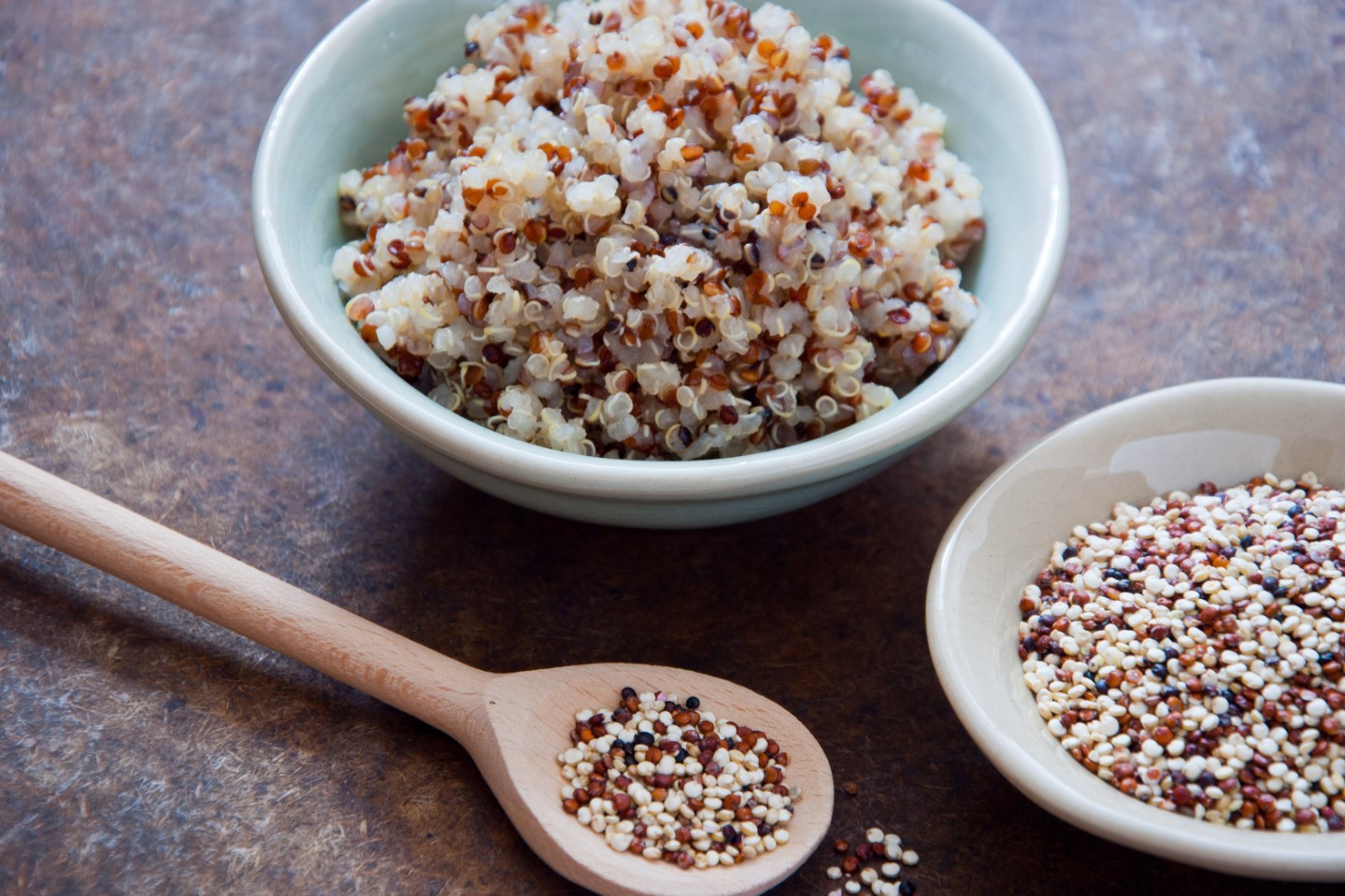
Quinoa – A Gluten-free Grain With Protein And Fiber
Quinoa is a gluten-free grain that is packed with protein and fiber, making it a great addition to any healthy diet. Originating from Peru, quinoa has been cultivated for thousands of years and is a staple food in many South American countries. In recent years, it has become increasingly popular in North America and Europe due to its numerous health benefits.
One of the main benefits of quinoa is its high protein content. Unlike other grains, quinoa is a complete protein, meaning it contains all nine essential amino acids that the body needs. This makes it an ideal food for vegetarians and vegans who may struggle to get enough protein in their diet. In fact, 1 cup of quinoa contains 8 grams of protein, which is more than most grains.
- Another benefit of quinoa is its high fiber content. Fiber is essential for digestive health and can help to prevent constipation and other digestive problems. It also helps to regulate blood sugar levels and can reduce the risk of heart disease and other chronic illnesses.
- Quinoa is also a good source of essential vitamins and minerals, including iron, magnesium, and phosphorus. These nutrients are important for maintaining healthy bones, muscles, and other bodily functions.
| Quinoa Nutritional Information | |
|---|---|
| Calories | 222 |
| Protein | 8 grams |
| Fiber | 5 grams |
| Iron | 15% of the RDI |
| Magnesium | 30% of the RDI |
| Phosphorus | 28% of the RDI |
Quinoa is incredibly versatile and can be used in a variety of dishes, from salads to stir-fries. It has a mild, nutty flavor and a slightly crunchy texture that makes it a tasty addition to many meals. It can also be used as a substitute for rice or pasta in many recipes.
In conclusion, quinoa is a nutritious and delicious grain that should be included in any healthy diet. Its high protein and fiber content, along with its essential vitamins and minerals, make it a great choice for vegetarians, vegans, and anyone looking to improve their overall health.
Kale – A Leafy Green With A Plethora Of Vitamins And Minerals
Kale, the nutrient-dense leafy green, is packed with vitamins and minerals that are crucial for good health. It’s no wonder that kale has become a popular food in recent years, with its reputation as a superfood and its versatility in recipes. But what exactly makes kale so nutrient-rich?
First and foremost, kale is an excellent source of vitamin C, providing more than 100% of the recommended daily intake in just one cup. This powerful antioxidant helps protect cells from damage, supports immune function, and promotes collagen production for healthy skin and bones.
Kale is also high in vitamin K, which plays a role in blood clotting and bone health. Just one cup contains over 600% of the recommended daily intake of this important vitamin. Additionally, kale contains significant amounts of vitamins A, E, and B vitamins, as well as minerals like calcium, iron, and potassium.
- Calcium: One cup of kale has about the same amount of calcium as a small carton of milk. Calcium is important for bone health, muscle function, and nerve transmission.
- Iron: Kale is a good source of iron, which is necessary for healthy red blood cells and oxygen transport throughout the body.
- Potassium: This mineral helps regulate fluid balance, blood pressure, and heart function. Kale contains more potassium per calorie than bananas!
But that’s not all – kale is also packed with antioxidants like beta-carotene and flavonoids, which have been linked to lower risk of chronic diseases like cancer and heart disease. And let’s not forget about its fiber content – one cup of cooked kale has 5 grams of fiber, which is important for digestive health and helps promote feelings of fullness.
All in all, kale is a nutritional powerhouse that should definitely be a regular part of a healthy diet. Whether you add it to salads, smoothies, or sauté it as a side dish, there are plenty of delicious ways to enjoy this versatile leafy green!
Chia Seeds – A Superfood With Omega-3, Protein, And Fiber
Chia seeds have become increasingly popular in recent years due to their amazing health benefits. Not only are they packed with essential nutrients, but they are also versatile and can be included in various dishes to enhance their nutritional value.
One of the most significant benefits of chia seeds is their high omega-3 content. Omega-3 fatty acids are essential for heart health and brain function, and chia seeds are one of the richest plant-based sources of this nutrient. In just one ounce of chia seeds, there is nearly 5 grams of omega-3 fatty acids!
Chia seeds are also an excellent source of protein, making them a great addition to plant-based diets. They contain all nine essential amino acids, which are the building blocks of protein. In fact, one ounce of chia seeds contains about 4 grams of protein.
- Chia seeds are rich in fiber, with about 10 grams of fiber in just one ounce.
- They are also a good source of calcium, magnesium, and phosphorus, which are essential for maintaining strong bones.
- Additionally, chia seeds are high in antioxidants, which protect our bodies from oxidative stress and inflammation.
One of the great things about chia seeds is that they are incredibly versatile and can be used in a variety of dishes. They can be added to smoothies, oatmeal, yogurt, salads, and even used as an egg substitute in baking recipes. In fact, when soaked in liquid, chia seeds form a gel-like substance that can be used as a thickener in recipes.
In conclusion, chia seeds are a superfood that everyone should consider adding to their diet. With their high omega-3 and protein content, as well as their rich fiber and antioxidant levels, chia seeds are an incredibly nutritious food that can help you stay healthy and vibrant.
Lentils – A Plant-based Protein With İron And Folate
Lentils are a type of legume that are high in plant-based protein, iron, and folate. They have been a staple food in many cultures for centuries due to their nutritional benefits and versatility in cooking. Lentils come in different colors such as brown, green, yellow, and red, and can be cooked in a variety of ways including boiling, simmering, and pressure cooking.
One of the main benefits of lentils is their high protein content. They are a great source of amino acids which are essential for muscle growth and repair. Lentils can be used as a substitute for meat in many vegetarian and vegan dishes, making them an important source of protein for those who do not consume animal products.
- Another important nutrient in lentils is iron which is essential for the production of hemoglobin in the body. Hemoglobin is a protein in red blood cells that carries oxygen to different parts of the body. A deficiency in iron can lead to anemia which is characterized by fatigue, weakness, and shortness of breath.
- Folate is another important nutrient found in lentils. It is a B-vitamin that is important for cell growth and development, especially during pregnancy. A deficiency in folate can lead to birth defects and other health issues.
- Lentils are also a good source of fiber which is important for digestive health. They can help regulate blood sugar levels and support healthy bowel movements.
Overall, lentils are an excellent source of plant-based protein, iron, and folate. They are versatile, affordable, and can be used in a variety of dishes such as soups, stews, and salads. Additionally, they are a great option for those who follow vegetarian or vegan diets or those looking to increase their intake of plant-based foods.

Dark Chocolate – A Delicious Source Of Antioxidants And Magnesium
Dark chocolate has long been touted as a guilt-free indulgence because of its health benefits. It is a rich source of flavonoids, which are powerful antioxidants that help protect the body from free radicals that can cause cellular damage. Additionally, it has high levels of magnesium, which is essential for many bodily functions including muscle and nerve function, and regulating blood sugar levels.
While milk chocolate and white chocolate do not provide the same nutritional value as dark chocolate, the higher cocoa content in dark chocolate means more flavonoids and less added sugar. The ideal percentage of cocoa for maximum health benefits is at least 70%.
- Antioxidants: The flavonoids found in dark chocolate have been shown to reduce inflammation and improve blood flow, which can lower the risk of heart disease. Additionally, they can help protect the skin against sun damage and promote healthy aging.
- Magnesium: With 176 mg of magnesium per 100g, dark chocolate can help prevent magnesium deficiency, which has been linked to an increased risk of type 2 diabetes, high blood pressure, and osteoporosis.
- Mood booster: Dark chocolate also contains phenylethylamine (PEA), which is a natural compound that stimulates the brain to release endorphins, the “feel-good” hormones that promote mood and happiness.
However, despite the health benefits, dark chocolate is still high in calories and should be consumed in moderation as part of a balanced diet. Aim for one to two ounces (28-56 grams) of dark chocolate per week to reap the maximum health benefits without overconsuming calories and sugar.
| Dark Chocolate Nutrition Facts (per 100g) | Percent Daily Value (DV) |
|---|---|
| Calories: 546 | 27% |
| Fat: 31.3g | 48% |
| Saturated Fat: 18.5g | 92% |
| Carbohydrates: 59.4g | 20% |
| Fiber: 10.9g | 44% |
| Protein: 7.9g | 16% |
| Magnesium: 176mg | 44% |
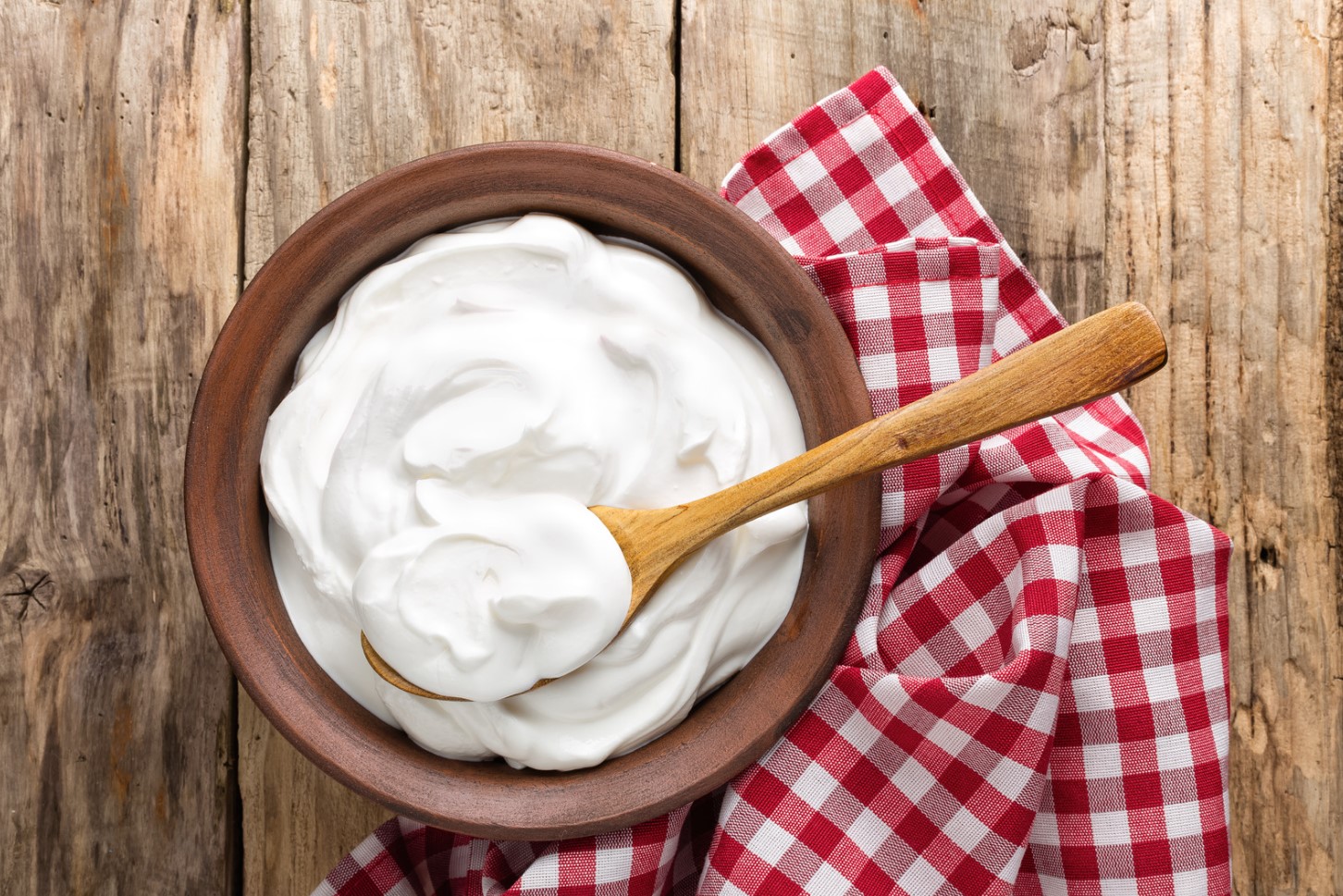
Greek Yogurt – A Protein-packed Snack With Probiotics For Gut Health
Greek yogurt has become increasingly popular as a healthy snack option. It is a thicker and creamier version of traditional yogurt which is strained to remove the whey, resulting in a higher concentration of protein. Greek yogurt also contains probiotics, which are live bacteria that offer numerous health benefits for the gut. In this blog post, we will explore the benefits of Greek yogurt and why it should be included in your diet.
Protein-Packed Snack: Greek yogurt has a higher protein content than regular yogurt. It contains approximately double the amount of protein per serving. Protein is essential for building and repairing tissues, making it an important nutrient for growth and maintenance of the body. Greek yogurt, therefore, is an excellent snack option for people who are looking to increase their protein intake. It can also help you feel full for longer, reducing the urge to snack on unhealthy foods.
Probiotics for Gut Health: Greek yogurt is a rich source of probiotics. These are the “good bacteria” that live in your gut and help keep your digestive system healthy. Probiotics are believed to improve digestion and boost the immune system. They can help reduce bloating, gas, and other gastrointestinal issues. Therefore, eating Greek yogurt regularly can promote a healthy gut and overall well-being.
Versatility and Flavour: Greek yogurt is a versatile ingredient that can be used in many different ways. It can be eaten as a snack, added to smoothies or used as a substitute for mayonnaise or sour cream. It can also be used as a base for dips and sauces. Greek yogurt comes in many flavours, including plain, vanilla, and fruity varieties. It can be sweetened with honey or maple syrup to give it an extra kick of flavour.
- Conclusion:
Greek yogurt is a nutrient-dense food that can provide numerous health benefits. It is a high-protein snack that can help with weight management and promote fullness. The probiotics in Greek yogurt can help maintain a healthy gut and boost the immune system. It is a versatile and delicious ingredient that can be used in many different recipes. Therefore, adding Greek yogurt to your diet can be an easy and tasty way to improve your overall health and well-being.